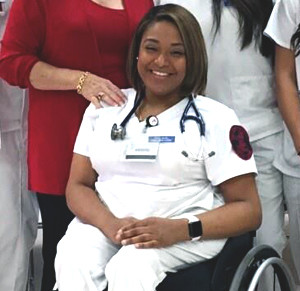Let's take a look back on 2018! Here are the top 10 Exceptional Nurse blog posts about nurses with disabilities.
Andrea Dalzell, Ms. Wheelchair New York and disability advocate becomes a nurse!
Andrea graduated with a BSN from the College of Staten Island and went on to pass her boards.https://exceptionalnurse.blogspot.com/2018/04/andrea-dalzell-ms-wheelchair-new-york.html
Can I become a nurse with my
lower arm missing?
"My name is Angelica Baeza and I'm a new Nursing 1 student currently attending Orange County Community College in Newburgh, NY. I was born without the lower portion of my left arm....Can I actually become a nurse?"
Nurses who are d/Deaf: Breaking boundaries and changing perceptions
The Royal College of Nursing's magazine reported on the experiences of nurses in the United Kingdom who are d/Deaf.
https://exceptionalnurse.blogspot.com/2018/01/nurses-who-are-ddeaf-breaking.html
Seventy one surgeries couldn't stop this nurse with spina bifida
Courtney Mangin was born with spina bifida and spent much of her young life as a patient at St. Louis Children's Hospital. Now she works there!
https://exceptionalnurse.blogspot.com/2018/10/seventy-one-surgeries-couldnt-stop-this.html
Marie Scott moves forward as a U.S. Embassy nurse after a spinal cord injury

"Born and raised in the Prague, Czech Republic, I was injured after I qualified as a nurse. At the time of my spinal cord injury (T-12 paraplegia), I was employed by the U.S. government in Prague. The understanding and support I received from the employer and colleagues will never be forgotten."
https://exceptionalnurse.blogspot.com/2018/06/marie-scott-moves-forward-as-us-embassy.html
Exclusive: Nurses with disabilities face discrimination in the workplace
This report was written by Jo Stephenson and published by the Nursing Times in the UK.
https://exceptionalnurse.blogspot.com/2018/04/a-passport-to-support-nurses-with.html
Sian Preddy, first profoundly deaf midwife in Wales

After having two children and a cochlear implant, Sian applied for midwifery training and "never looked back".
https://exceptionalnurse.blogspot.com/2018/03/sian-preddy-first-profoundly-deaf.html
Low vision isn't low intelligence
https://exceptionalnurse.blogspot.com/2018/03/sian-preddy-first-profoundly-deaf.html
Low vision isn't low intelligence
Deven Kelly, a nursing student with diabetic retinopathy perseveres and graduates!
For Cerebral Palsy awareness month: We celebrate Carla Pease, a Nurse Practitioner with CP!
Carla Pease was born with cerebral palsy. She finished her LPN certificate and then finished an RN program. Carla continued on to get her masters in nursing. She is a nurse practitioner.
Access to RN-BSN programs for nurses who use wheelchairs
A nurse who uses a power wheelchair shared this story:I attended the first week of classes and was told, "you can't be a nurse because you don't meet the college's technical standards." There is a small component of the program that includes a clinical experience and they said I wouldn't be able to participate as, "I must be able to ambulate without any assistive device".
"Isn't this screaming discrimination?"
Happy Holidays!
With thanks to all who shared and commented.
Cheers!
Donna































